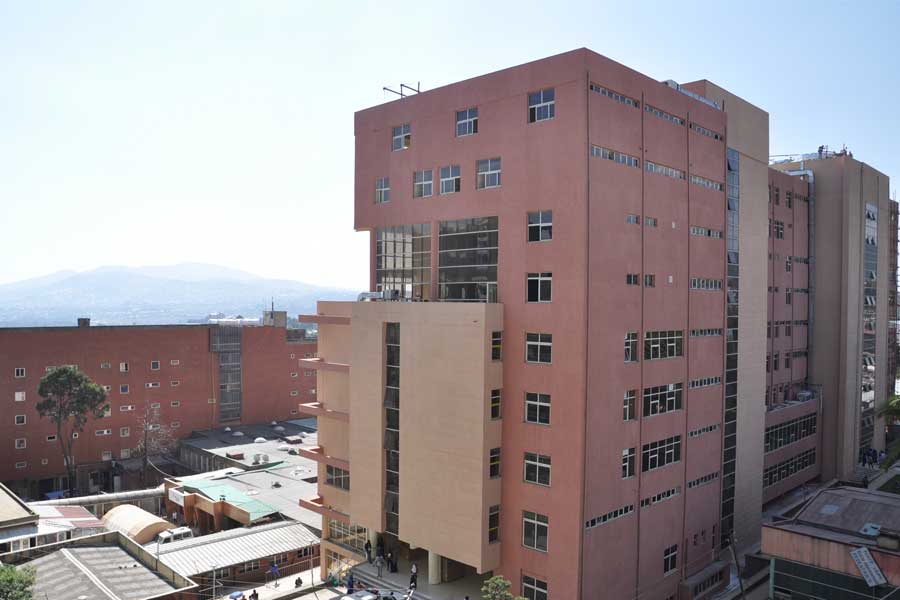
Commentaries | Feb 26,2022
Oct 16 , 2021
By Christian Tesfaye
It is no secret that Ethiopia's higher learning institutions are not terribly concerned with preparing their students for the labour market. Too much premium is placed upon ensuring that the number of undergrads and graduates increases, and voila! Suddenly the student is expected to become a real-world problem solver.
Part of the problem with this is that the real world is several levels removed from the noise-free, straightforward realm of theory. Take microeconomics, which is founded upon the concept of demand and supply. Both producers and consumers are supposed to gradually maximise their utility by reaching an equilibrium point where a good or service is sold for an ideal price that makes both parties happy.
This is all good and well. The mathematics on this is perfect. In the real world, however, its application is minimal. Information does not reach everybody equally (information asymmetry), costs to society are not equally shared (externalities) and markets often are distorted by a few players unless regulators are involved (monopolistic behaviour). In the end, consumers are worse off.
Of course, microeconomics admits this. It refers to them as market failures. But the higher learning institutions where this field is thought spend a minimal amount of time helping students understand how real-world business works. One significant way they do this is by burdening their students with exams that require rote learning.
The problem with rote learning is that there is not much use for it in a world where everyone has information at their fingerprints. Nearly everything that exists in academic textbooks could also be uncovered through the Google search engine. Anyone with a good conceptual understanding of the subject matter could tackle any real-world problem using tools that could be found on the internet, especially in the age of open-source movements.
Rote learning is even more unnecessary when automation is taking over tasks that are merely repetitious and bulky. It is much more helpful to learn how to use programming languages and develop the habit of updating oneself on a chosen field instead of attempting to memorise the totality of formulas and exact definitions.
The rigidity of Ethiopia’s higher learning institutions is all the more harmful given that the workplace demands skills that are rarely referenced in academic textbooks. Soft skills such as emotional intelligence, formal communication and how to utilise interdisciplinary learning are disregarded, the latter of which is critical to problem-solving.
The next generation of entrepreneurs, innovators, business leaders and policymakers would be better served with open book exams. They would have the textbooks in front of them, and they would be asked to solve problems as they would be doing in the real world. The depth and breadth of their knowledge about the subject matter would be tested, as well as their ability to understand and adapt to challenges as they come. They would also improve their skills in developing real-life applications for the theories they have been taught in class instead of struggling to memorise what, say, the “nth” article of the “n” chapter in the Ethiopian Commercial Code says.
Part of the problem is that an excess of college professors are lazy in crafting real-world examples of problems for their students that would challenge them during exams. They rather merely ask to explain this or that, or work out an exercise they have previously taught in class but with some numbers substituted.
The scarcity of professionals with advanced problem-solving skills is one primary reason Ethiopia plays virtually no role in the knowledge production endeavour of the human species. With the way we continue to insist that students memorise every textbook out there, we will ensure that this continues to be the case.
PUBLISHED ON
Oct 16,2021 [ VOL
22 , NO
1120]


Commentaries | Feb 26,2022

Viewpoints | Jun 07,2020

My Opinion | Feb 20,2021

Agenda | Apr 28,2024

Viewpoints | Feb 05,2022

View From Arada | Sep 24,2022

Agenda | Mar 28,2020

Commentaries | Jun 15,2024

Viewpoints | Sep 06,2020

Fortune News | Nov 02,2019

Photo Gallery | 177815 Views | May 06,2019

Photo Gallery | 168028 Views | Apr 26,2019

Photo Gallery | 158736 Views | Oct 06,2021

My Opinion | 137014 Views | Aug 14,2021
Commentaries | Oct 25,2025

Dec 22 , 2024 . By TIZITA SHEWAFERAW
Charged with transforming colossal state-owned enterprises into modern and competitiv...

Aug 18 , 2024 . By AKSAH ITALO
Although predictable Yonas Zerihun's job in the ride-hailing service is not immune to...

Jul 28 , 2024 . By TIZITA SHEWAFERAW
Unhabitual, perhaps too many, Samuel Gebreyohannes, 38, used to occasionally enjoy a couple of beers at breakfast. However, he recently swit...

Jul 13 , 2024 . By AKSAH ITALO
Investors who rely on tractors, trucks, and field vehicles for commuting, transporting commodities, and f...

Oct 25 , 2025
The regulatory machinery is on overdrive. In only two years, no fewer than 35 new pro...

Oct 18 , 2025
The political establishment, notably the ruling party and its top brass, has become p...

Oct 11 , 2025
Ladislas Farago, a roving Associated Press (AP) correspondent, arrived in Ethiopia in...

Oct 4 , 2025
Eyob Tekalegn (PhD) had been in the Governor's chair for only weeks when, on Septembe...

Oct 25 , 2025 . By YITBAREK GETACHEW
Officials of the Addis Abeba's Education Bureau have embarked on an ambitious experim...

Oct 26 , 2025 . By YITBAREK GETACHEW
The federal government is making a landmark shift in its investment incentive regime...

Oct 27 , 2025
The National Bank of Ethiopia (NBE) is preparing to issue a directive that will funda...

Oct 26 , 2025 . By SURAFEL MULUGETA
A community of booksellers shadowing the Ethiopian National Theatre has been jolted b...